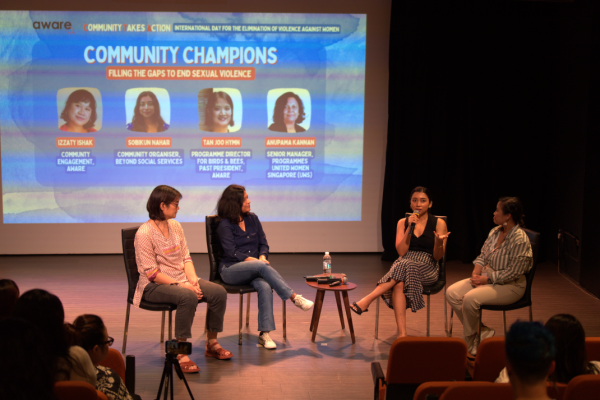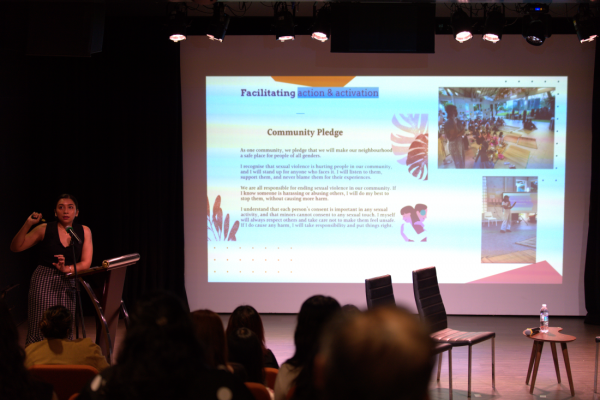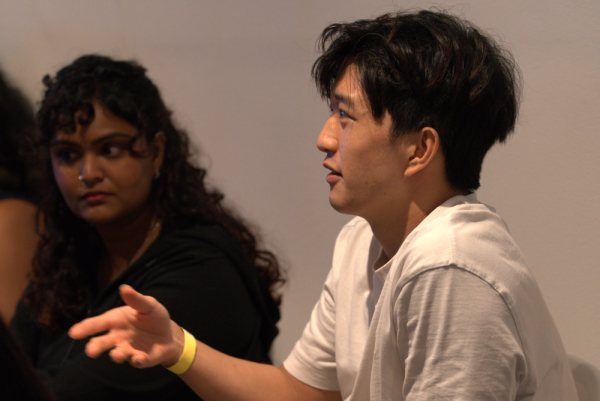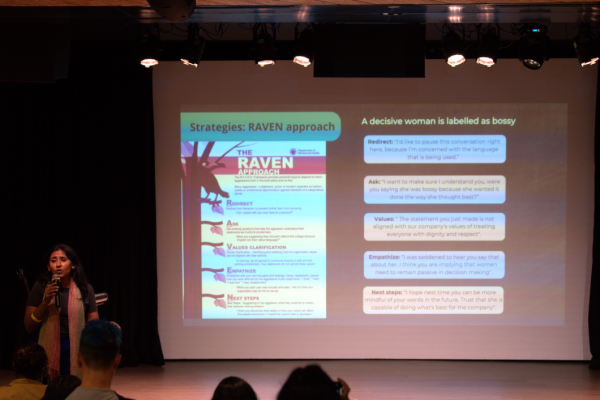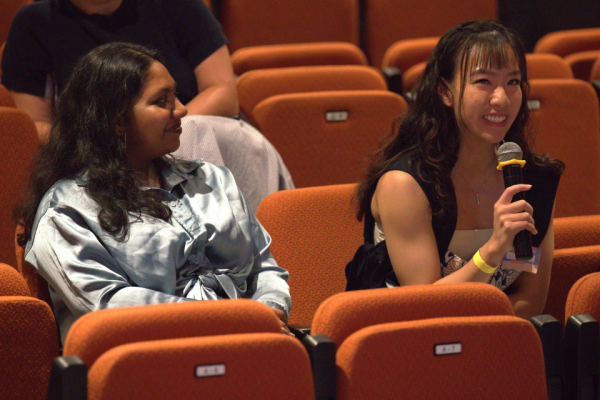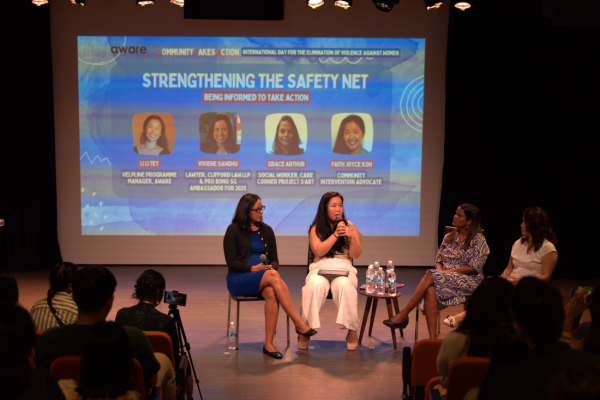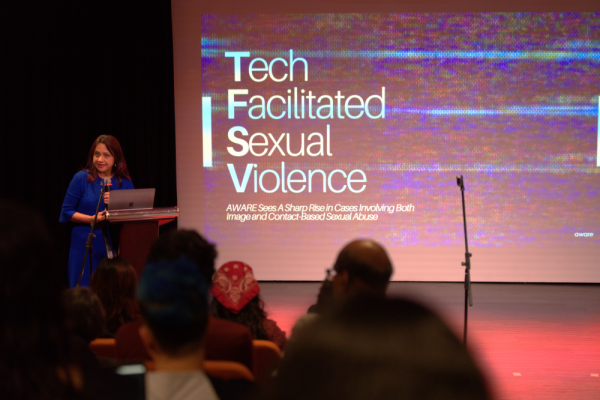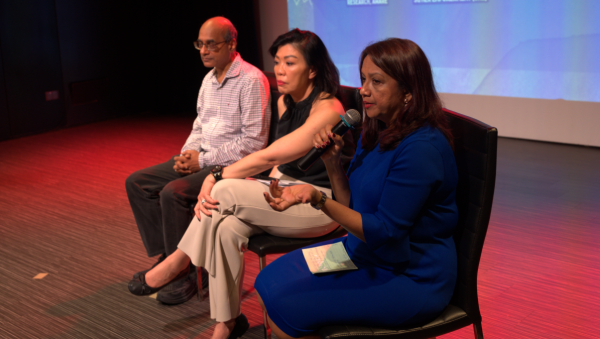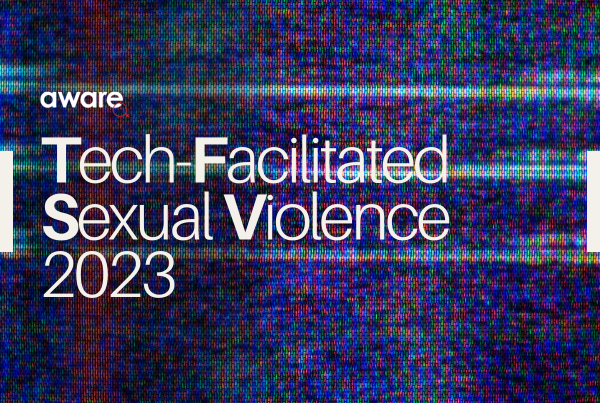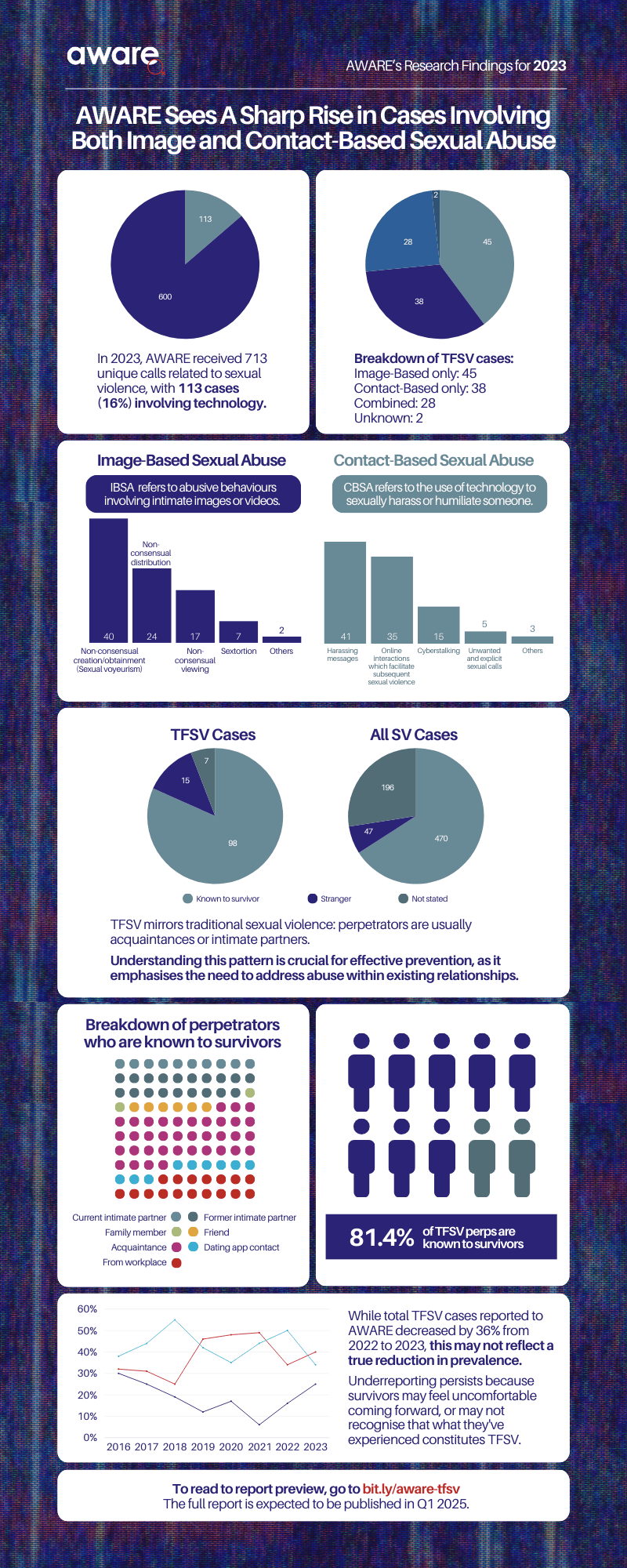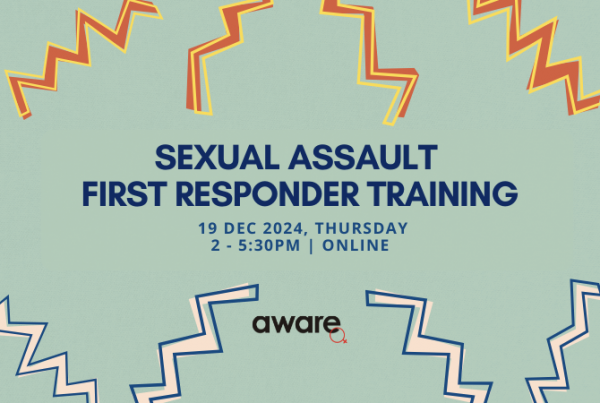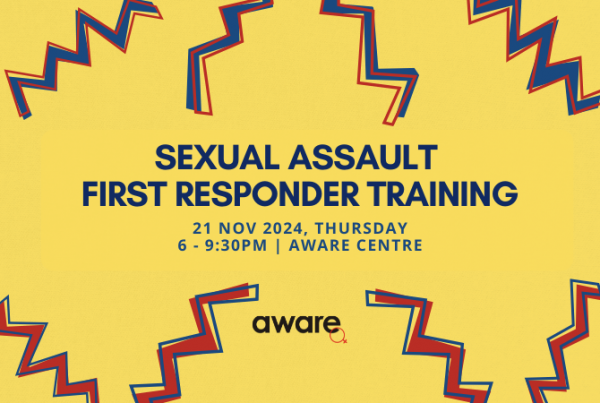Unite with advocates and experts to disrupt gender-based violence. Help build a safer and more inclusive society—change starts here! Tickets are available for morning, afternoon and full day sessions.
This event is an opportunity to engage with leading experts, passionate advocates, and community changemakers who are working to end gender-based violence. Whether you are a student, a professional in the social services field, someone interested in becoming a first responder, or simply a member of the public who wants to make a difference—this event has something meaningful for you. We will also be announcing our new findings on tech-facilitated sexual violence—register now and be the first to know.
COMMUNITY TAKES ACTION 2024: DISRUPT THE NORM
📅 Date: Saturday, 30 November 2024
🕘 Time: 9am to 6pm
📍 Venue: 10SQ, Orchard Central (Somerset MRT)
Ticketing
Get your seats here: 🎟️ https://bit.ly/awareidevaw2024
Why You Should Attend
This event is a chance to engage with leading experts, passionate advocates, and community changemakers dedicated to ending gender-based violence. Whether you’re a student, social service professional, or someone keen to make a difference—there’s something meaningful here for you.
- For the General Public: Gain insights into tech-facilitated sexual violence, the impact of gender stereotypes, and ways to break the cycle of abuse. Empower yourself with knowledge and actionable steps.
- For Students: Connect with experts, discover new career paths, and engage in crucial conversations about gender-based violence and community action.
- For Social Service Professionals: Expand your knowledge of best practices and strategies to support survivors, learn from frontline professionals, and enhance your intervention toolkit.
Programme Highlights
📝 Poetry by UWCSEA East—VOWS Student Group

Opening Keynote and AWARE’s New Findings on Tech-Facilitated Sexual Violence
It’s time to talk about disrupting gender-based violence! Corinna Lim, our Executive Director, will welcome attendees and delve into the pressing issue of sexual violence, especially in online spaces. This will be followed by the debut of AWARE’s new research on tech-facilitated sexual violence (TFSV) with Sugidha Nithiananthan, our Director of Advocacy and Research.

Panel 1: Digital Danger
Meet a panel of experts to learn about tech-facilitated sexual violence (TFSV) and image-based sexual abuse, including deepfakes, and how they are perpetuated online.
Panelist Stefanie Yuen Thio, the Chairperson of SG Her Empowerment (SHE), a support centre for survivors of online harms; and moderator Sugidha Nithiananthan, AWARE’s Director of Advocacy and Research, will share how to create impactful interventions to counter tech-facilitated violence and create safer digital spaces. Don’t miss this crucial conversation on the evolving digital threats and how we can collectively combat them.
Stephanie represented SHE at the CEDAW meeting in Geneva where she talked about the threat of online harms and advocated for an office for e-safety in Singapore. Mohan Kankanhalli is the director of NUS AI Institute. Sugidha has spent more than 25 years as a litigator and corporate lawyer. She has been a loyal supporter of AWARE for decades, volunteering in its legal clinic and other areas.

Panel 2: Strengthening Safety Networks
Learn about the support available to people facing violence from frontliners of domestic violence intervention and recovery. Panelists Grace Arthur, a social worker at Care Corner Project StART; Viviene Sandhu, a lawyer from Clifford Law LLP; Faith Joyce Koh, a community intervention advocate; and moderator Li Li Tey, AWARE’s Helpline Programme Manager, will explore how first responders can support survivors when they access these services. They will also examine the challenges survivors and perpetrators face when they seek help, and how first responders can encourage them to seek support.
Grace manages family violence and sexual violence cases at Care Corner. Viviene is a lawyer, mediator and Pro Bono SG Ambassador for 2025. Faith went viral on TikTok when she shared how she intervened during incidences of domestic violence, calling on others to intervene too. Li Li is a seasoned social work professional with a passion for empowering individuals and advocating for social justice.

Panel 3: Community Empowerment
Join community changemakers as they explore how harmful gender norms and inadequate sex education fuel violence and discrimination within communities. Panelist Sobikun Nahar, a community organiser with Beyond Social Services; and moderator Joo Hymn, AWARE’s Programme Director for Birds & Bees, our comprehensive sex education programme, will showcase community-based initiatives that create safe spaces and foster healthy gender dynamics, and share the key learning practices and challenges they face. This discussion will encourage community members, leaders, and organisations to actively build a culture of respect, safety, and empowerment for all genders.
Sobikun creates spaces for communities to discuss their issues and the actions they would like to take through outreach, facilitated conversations, applied drama and more. Joo Hymn has been a volunteer at AWARE for over 25 years as well as being a Past President.
Breakout Sessions
We have a total of six breakout sessions. They are split between two sections of the day: AM, from 12:45PM to 1:45PM, and PM, from 3:15 PM to 4:15PM. The breakout sessions “Disrupting Microaggressions” and “Conscious Communication, Consent and Boundaries” run in both the AM and the PM. “Your Ideas for Co-Creating Masculinity” only runs in the AM. “Your Ideas for Consent Education” only runs in the PM.
If you have an AM ticket, you can only attend one AM breakout session. If you have a PM ticket, you can only attend one PM session. If you have a full day ticket, you can attend one AM session and PM session. We will send you a Google Form so you can select your preferred breakout session. They are on a first come first serve basis.

AM & PM: Disrupting Microaggressions
Join us for an insightful workshop led by Dr. Annette S. Vincent, on how seemingly minor actions and comments can perpetuate gender-based discrimination in our daily lives. Learn practical strategies to recognize and disrupt microaggressions in various settings, from workplaces to social environments. Dr. Vincent is a Green Dot Certified facilitator and former Associate Dean for Diversity, Equity, Inclusion, and Belonging at Carnegie Mellon University. In her previous role, Dr. Vincent championed initiatives that cultivated a welcoming and inclusive environment for all.
Note: Breakout sessions are on a first come first serve basis. After confirming your registration, we’ll send you a form so you can sign up for your preferred breakout session. Remember to sign up as soon as possible!

AM & PM: Improv Workshop on Conscious Communication, Consent, and Boundaries
Learn healthy communication skills by participating in improvisational games! Improv director and intimacy choreographer Prescott Gaylord will engage you in exercises with fellow participants to explore listening, open communication, co-creation, supportive behaviour, clear boundaries and taking care of yourself. Prescott has performed in and directed large and small-scale improvised projects in Baltimore, Philadelphia, Pittsburgh, Bethelhem, Washington D.C., Austin, New York, Manila, Shanghai, and Chicago.
Note: Breakout sessions are on a first come first serve basis. After confirming your registration, we’ll send you a form so you can sign up for your preferred breakout session. Remember to sign up as soon as possible!

AM: Your Ideas for Co-Creating Masculinity
Join us for an engaging conversation led by Devanantthan Tamilselvii, the Executive Director of Mental ACT, a non-profit organisation that provides mental health services and programmes for the South Asian community in Singapore. This session invites participants of all genders to share their thoughts, experiences, and aspirations for healthy masculinity in young men.
Together, we’ll explore themes such as identity, respect, and emotional well-being while gaining insights from diverse perspectives. Expect a safe, inclusive space for open dialogue where we can collaboratively share ideas that support the development of a masculinity programme that resonates with the needs of young men today. Let’s tap into our collective strengths to build a more supportive future.
Note: Breakout sessions are on a first come first serve basis. After confirming your registration, we’ll send you a form so you can sign up for your preferred breakout session. Remember to sign up as soon as possible!

PM: Sex Education in Singapore
This session is an open dialogue that invites participants of all genders to share their thoughts, experiences, and aspirations for sex and consent education in Singapore. Together with Tan Joo Hymn, AWARE’s Programme Director for Birds & Bees, our comprehensive sex education programme, we’ll explore themes such as communication, respect, and healthy boundaries, while gaining insights from diverse perspectives. Expect a safe, inclusive space where we can collaboratively exchange ideas, to shape an impactful sex and consent education program for the needs of youth today. Let’s harness our collective strengths to empower a more informed and respectful generation.
Note: Breakout sessions are on a first come first serve basis. After confirming your registration, we’ll send you a form so you can sign up for your preferred breakout session. Remember to sign up as soon as possible!
This event is a unique platform to connect with thought leaders, engage in critical conversations, and take part in hands-on workshops. Let’s come together to disrupt the norm, promote gender equality, and support survivors.
COMMUNITY TAKES ACTION 2024: DISRUPT THE NORM
📅 Date: Saturday, 30 November 2024
🕘 Time: 9am to 6pm
📍 Venue: 10SQ, Orchard Central (Somerset MRT)
Ticketing
Get your seats here: 🎟️ https://bit.ly/awareidevaw2024




